
- •It's time to talk
- •12 Unit two
- •It's time to talk
- •Information
- •Vocabulary
- •It's time to talk
- •26 Unit six
- •Is there a carpark? Are There mm
- •28 Unit seven
- •It's time to talk
- •1 Remember
- •It's my kind of town
- •Vocabulary
- •It's time to talk
- •48 Unit fourteen
- •5 Sans nrOnTlBks artSfN zonder GfffWzcw
- •Vocabulary
- •Information at Arriving without luggage
- •Vocabulary
- •60 Unit seventeen
- •Ivd. DArtU/
- •Vocabulary
- •It's time to talk
- •Isabelle Segura is a pa in Neuilly, just outside Paris. She talks about her working week.
- •IvcTion pro
- •It's time to talk
- •Vocabulary
- •78 Unit twenty-three
- •It's time to talk
- •Vocabulary
- •It's time to talk
- •Vocabulary
- •It's time to talk
- •Vocabulary
- •7 Changing workspace
- •It's time to talk
- •7 Changing workspace
- •Its time to talk
- •It's time to talk
- •It's time to talk
- •Its time to talk
- •Verbs not usually in the continuous form
- •Irregular verbs
- •7 Changing workspace
- •8 The a team
- •Interviewer:
- •Interviewer:
- •Interviewer:
- •It's almost the weekend
- •7 Changing workspace
- •8 The a team
- •12 Do you salsa? I've got news for you lg 2d 3c 4h 5b 6f 7a Be
- •138 Answer key
- •Visited
- •140 Answer key
- •It's lime to talk
- •Inviting
- •142 Answer key
Vocabulary
Work
Meet Paul Mundei He runs an Interne service for people in education from his home in the UK. Find out what he likes about his job.

high
I get a
very low
salary!

Warm
Tell your partner two things you like and one thing you don'l like about your job. Use these ideas or your own tdeas
salary colleagues office
travel to work food
Read on
Homeworking
1 We interviewed Paul Munden about his job. Match the headings with his answers.

get a veriA ttlanj! /
1 Working with my wife 2 Working with the Internet 3 Working with writers 4 Working and relaxing
 I'm
a writer myself, writing poetry. But
t woik tor the Nafi-onal Association
ol Writers in Education. This
is an organisation to help writers
and leachers work together to
give courses on writing in schools.
In this way. we help children and adults write poetry or whatever
they want It's great. I love working in education and with
writing.
I'm
a writer myself, writing poetry. But
t woik tor the Nafi-onal Association
ol Writers in Education. This
is an organisation to help writers
and leachers work together to
give courses on writing in schools.
In this way. we help children and adults write poetry or whatever
they want It's great. I love working in education and with
writing.
The Internet is very important lo my work. I work a lot with our website. where we put ideas which leachers and writers can use in their lessons. But tor me. technology is a problem. I live in the country so I have a slow Internet connection and I often have connection problems. It's really frustrating sometimes.
Sometimes its difficult to relax because my wort is al home, but I never work at the weekend. We have a nice garden and I enjoy sitting there and doing some gardening. I also play football with friends But you have to be careful because it's very easy to slay at home too much. So you must push yourself (o go out and meel friends.
I spend a lot ot time working from home, which is great. I prefer lo work alone. I can get up in the morning and go directly to my desk with no traffic problems. Also, when the children were younger, it was nice to look after them. And now I work with my wife because she is the organisations database manager I like it because we can discuss work problems very easily and openly. But some people think spending all that time together is terrible.
Read the text again and find:
two things Paul does to relax.
what Paul likes about working from home.
what Paul has problems with at work.
what Paul likes about his job.
What
do you think'
Unit eleven 3
The words you need ... to talk about work





1
Complete these sentences wilh the correct word from the diagram.
On
Tuesdays 1 work home.
I
never work the weekend.
1
usually work a team.
1
want to work maybe in China.
I
often work and enjoy the quiet!
I
work not
full-time.
In
pairs, ask questions using these expressions.
Example:
mm
VQd
y°u
sometimes work ai horn
I have too many meetings.
I have a very good boss.
I have a big office.
I work long hours.
I have too much to do.
I can socialise with colleagues a lot.
1 travel a lot for work.
1 can work from home twice a week.
Which sentences describe you?

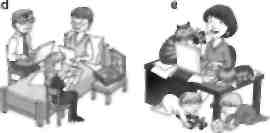


bOSS is
more Important than ™ney,andlhave
to liKe the people at
WorK..

 1
What do you want from your job? Number the following things in order
of importance in the table below.
1
What do you want from your job? Number the following things in order
of importance in the table below.
Job You Person 1 Person 2 |
|
A good salary Training A good manager Flexible working hours Travel opportunities Working from home Working in a team Good holidays Other |
|
2 Now interview two other people and complete the table.
So whatsV Tor me a qood
important ' toyovf
Communicating at work
Emails 1: Giving your emails a clear structure

 1
When writing emails, we often write with four main parts: the
greeting, the reason for writing, the action point and Ihe close.
Complete the email opposite with the phrases in the box.
1
When writing emails, we often write with four main parts: the
greeting, the reason for writing, the action point and Ihe close.
Complete the email opposite with the phrases in the box.
a |
Best wishes |
b |
Please could you send me an agenda as soon as |
|
possible? |
c |
Dear Francisco |
d |
I can confirm that 1 will be at the sales meeting |
|
next week. |
From: Sandrine Gaslain To: Francisco Ferreira Subject: Sales meeting
Greeting (1)
Reason for writing (2)
Action point (3)
Close (4)
2 Match the four reasons for writing with the action points.
Reasons for writing
I need to contact John Peters about a computer problem but can't find his number or email address.
It would be good to discuss the production schedule.
Attached is an Excel file wiih information about product no. 333.
1 spoke to Pedro yesterday on the phone about our trip to Canada.
3 Write three emails using the notes in your diary. Structure the emails carefully. Give a clear reason for writing and an action point.
Action points
a Can we discuss flight arrangements for Tuesday after the marketing meeting? See you
b Could you send them to me asap? Thanks
c Please con tact me if you need any more information. Best regards
d Could you give me a call tomorrow? Regards
•
WEDNESDAY
 jvwd
drive V&r
wer.
jvwd
drive V&r
wer.
Ask k*r *» <*" twurrow. S i-^ Url *•« ll » p^'0*
W* ™ «»' 9fWS *48?
»
Unit eleven 41

IB Do you salsa?

Responding
to surprising news
A: See you tomorrow.
B: Yeah, see you. What are you
doing tonight?
A: (7) I
might go logging.
B (8) !
I don't believe it.
You hate sport. A:
Yes. but I need Ihe exercise.
You're joking t never mind g Congratulations h 01 course I will
Responding to bad A.
HI. Good weekend? B; Yes, very I have some
news. My wile's pregnant.
A.
HI. Good weekend? B; Yes, very I have some
news. My wile's pregnant.
A Wonderful. (1) !
B Thanks. We're very happy. A. Oh, good. (2)
I'm not sure yet b Why's that c Really d We must celebrate
'•■ -.-; j j Responding t»
A: Hey. Peler I've gol an email Irom A; So you leave lor ihe US tonight?
B: Don't ask! My trip's cancelled!
A: (5) ?
B: Because I have to stay here lor a
meeting wilti my boss A; Oh. well, (6) Now you
can come to Helen's parly
tonight
China.
B;(3) 9
A Yes. it's a new customer. I think.
The/ want information about our
ptoducts. B: Great. Please tell me il you hear
any more Irom them. A-(4)
ii
r the dialogues above and ma' 111%; with I Ik' words he low.
d news
ood weekend7
ling to interesting news Responding to snip
..' listen and check
aise reading the dialogues With a pa rim
HHItllBtm

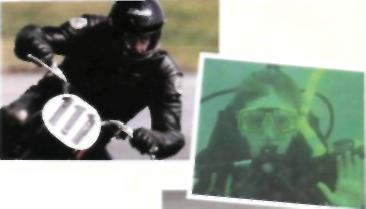
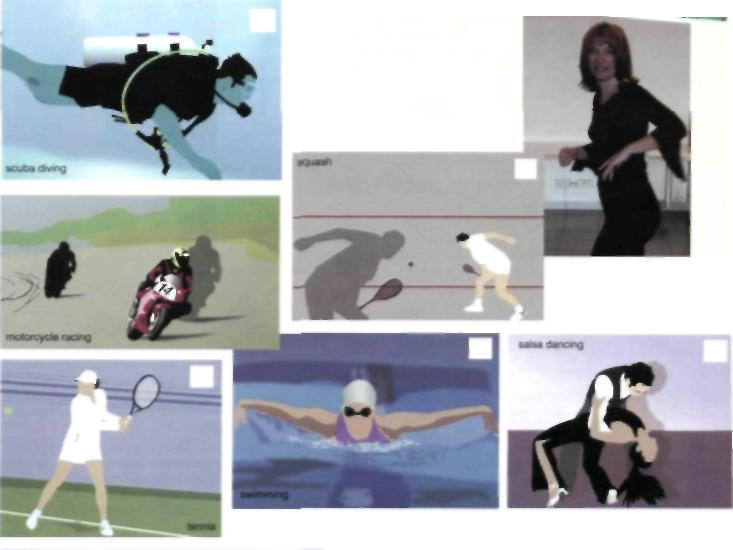 Listen
to this
Listen
to this
I hate watching TV
1 Listen to Ben, Alison and Roisin talking about sport and physical exercise. What are their main free-time activities? Write the initials by the activities (B.A.R). >M2.2
Meet Ben, Alison and Roisin. Find out what they think about different sports and free-time activities.
2 Now listen again. What do they say about their activities? Match a person to the sentences. Write their initials by the sentences (B. A. R). >W12.2
It's good exercise.
I have to relax after work.
Winning is not important.
1 hate sport on TV.
I like being alone.
I like to sociaLise.
wii.n (in you think?
'People watch too much television. It's better to go out and do something!' Do you agree?
Unit twelve 43
The words you need ... to
talk about sport
1 Complete
the sentences about famous sporting moments with the past
form
of the correct sports verb.
In
2002 Germany to Brazil in the World Cup final.
In
the 2003 Wimbledon final, Serena Williams her
sister.
Venus.
Michael
Schumacher the 2001 Formula 1 Championship.
In
the 2002 Chicago marathon. Paula Radcliffe some of the
best
runners in the world.
5 In
the 1972 Olympics, Mark Spitz seven gold medals.
What's
the difference between win
and
heal?
Can
you describe some more famous sporting moments using the verbs?
2 Which
verbs go with these sports? Put each sport in the right
column
below. Sometimes the activity can go in more than one
column.
Example:
I go jogging -go + activity
I
do some / a little jogging =
do* quantity
* activity
«e
hockey
cycling
footbal
walking
swimming
weight training
play
do
stmt
I a. Utile
Joggoig
It's time to talk
Can
you think of one or two more sports for each verb? How do you say
the following sporting scores?
Football
Real
Madrid Real Madrid Real Madrid Real
Madrid
0-0
Bayer Leverloisen - 0 Bayer Leverkusen Bayer
Leverkusen 2-1
Bayer
Leverkusen
Tennis
Henri
15-0 Schmidt
Henri
15- 15 Schmidt
Henri
30 -15 Schmidt Henri 40 - 40 Schmidt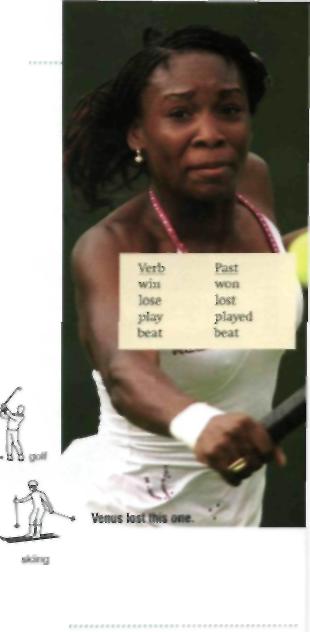


![]()
|
What |
Why |
|
Sports and activities you like doing Sports and activities you like to watch Sports and activities you dislike A sporting event you would like to see A sportsman or woman you like to watch Your favourite sport Ybur favourite sporting moment |
|
|
|
 4
In tennis, what is the difference between a gume. a set. and a
match?
4
In tennis, what is the difference between a gume. a set. and a
match?
Remember
Learn verbs that go with sports;
• play football • do some yoga
go skiing
E Chanel
Versace
Listen to this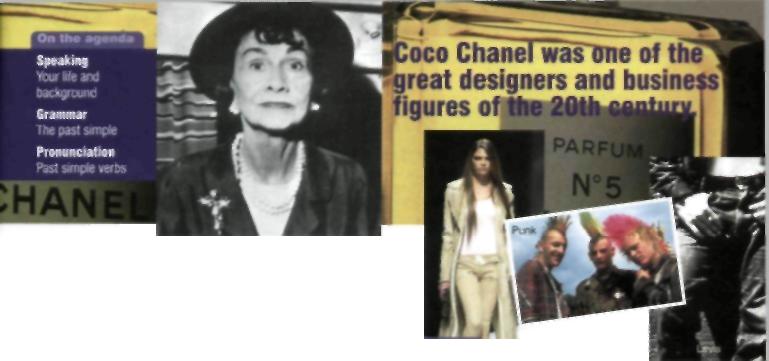 Do
you follow fashion? What kind of clothes do you
like'' Why?
Do
you follow fashion? What kind of clothes do you
like'' Why?

How
did Coco get her name?
Why
did she give her famous perfume the name
Chanel
No. 5?
What
did Yves Saint Laurent do for her in 1967?
What
can we see of Coco Chanel in ihe business world of today?
It wasn't very interesting.
They
(2) very
happy.
No, I (3)
No. they weren't
No. I didn't.
reference
page
115 n^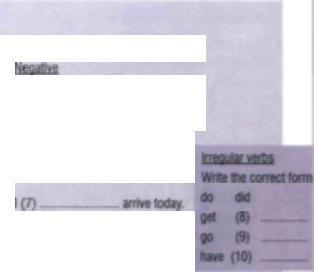
2 Listen again and answer the questions. ►Ml 3.1
1 We interviewed fashion designer Julie Williams about Coco Chanel's life. Match the events in her life to the year they happened. ►W13.1
1883 1910 1921 1924 1946 1954 1971
a moved to Switzerland
b died at the age of 87
c opened her first clothes shop called 'Chanel Modes'
d joined with Pierre and Paul Wertheimer to create a
'She changed women's lives.' Is fashion important in your life?
What do you think?
company. Societe des Parfums Chanel e launch of the first perfume Chanel No. 5 f born in the Loire region of France g returned to Paris
We can use the past simple tense to talk about our past life and past events. Complete the sentences below.
The past simple
Positive
It was good.
They were very happy.
Yes. I was. Yes, they were.
I (6)
yesterday.
Yes. I did.
Question
Thfl yen) to be: was/were + noun/adjective
How (1) the trip? (noun)
Were they happy? [adjective)
Was/were + short answers
Were you busy?
(4) they happy?
Wh- questions
When (5) you arrive?
Ptft short answers
Did you have a good trip?
Irregular verbs
irregular verbs do not form the past simple positive with the verb -
Unit thirteen 45
![]()
 Do
it yourself
Do
it yourself
1 Correct the mistakes in these sentences.
I have done it yesterday.
I didn't had time.
Did you were busy?
What have you done last night?
2 Read about the life and career of Stella McCartney, a fashion designer today. Complete the following text with the correct form of the verbs in brackets.
1971 She(l) (be) born and grew up in England.
1986 At 15 she (2) (start! working with Christian Lacroix
and spent several years apprenticed to a Savile Row tailor.
She (3) (leave) because she (4) (not/want)
to work with fur.
1995 She (5) (graduate) from London's Central St Martin's
College of Art and Design.
1997 At 25. she |6| (join) Chloe and (7) (stay!
there for four years.
2001 In Match 2001 she (8) (leave) Chloe to begin her
own label 'Stella McCattney' in partnership with Gucci.
She (9) (launch) this label in Paris later that year.
Her father and many celebrity friends (10) (be)
there to support her.
3 Complete the questions about Stella McCartney's life. The answers are on the right to help you.
Questions Answers
When (1) she born? 1971
Where did she (2) up? England
Where (3) she (4) ? St Martin's College
When did she (5) Chloe? In 1997
How (6) did she (7) there? For four years
Ask your partner questions about his/her life and career.
4 The past simple is very important in everyday social conversation. Complete the dialogue.
cenevieve: Afternoon. Peter. You look tired! What did you (1) last night?
peter: Hi. I (2) to a restaurant for an early dinner and then to the
cinema.
cenevieve: What (3) you see?
peter: A Russian film. It (4) about a family in Moscow. I don't
remember the title.
Genevieve: Was it good?
peter: No. it (5) I (6) understand it really.
Now listen and check. ^13.2
46 Unit thirteen
The past simple
1 Listen to the three different ways we pronounce -erf. ►N13.3
/id/ wanted i\i walked /d/ played
A simple rule: We only say u\ with verbs ending with the letters t or rf.
2 Listen lo the pronunciation ol the verbs below. Decide il they are ft/, W or /id/. ►M13.4
wanted received
liked
increased
enjoyed
talked
listened
walked
visited
decreased
decided
looked
Test your partner
Test your partner's pronunciation of regular verbs in the past tense. Point to a past verb. Your partner must say the word. Does he/she say the -ea* ending correctly?
3 Pronounce the past lorm ol these irregular verbs.
bring - brought say - said take - took
buy - bought see - saw tell - told
read-read speak-spoke think - thought
Now listen and check. ►Ml 3.5
